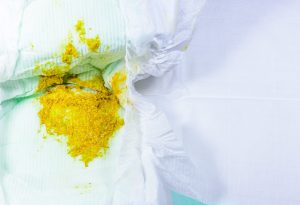In this Article
- What is the normal frequency of baby stool?
- How will baby poop be like?
- What will your baby’s poop be like if you are breastfeeding?
- What will your baby’s poop be like if you are formula feeding?
- Changes in poop when switching from breastfeeding to bottle
- Baby’s poop after introducing solids
- What kind of baby potty is not normal?
If you are a new parent, you will agree that one of the least exciting parts of being new parents is baby poop! Nevertheless, it is an inevitable part of having a baby.
As is normal with all new parents, from the time you come across baby’s first stool, you may be wondering what is normal and what isn’t. Let us explore this subject in greater detail to analyze when you should be concerned about what passes out of your baby.
What is the normal frequency of baby stool?
| Age of Baby | Minimum number of bowel movements | Texture and color of the baby stool |
| 1 day old | 1 | Black and tarry in nature |
| 2 days old | 0-1 | Black and tarry in nature |
| 3 days old | 1 | Greenish in color, transitional |
| 4 days old | 4 | Yellow or Green in Color |
| 5 days old | 3-4 | Loose in Nature, Yellowish in colour |
| 6 days old | 3-5 | Loose in Nature, Yellowish in colour |
| More than six weeks old | May range from 1 every 7-10 days to 3-5 per day or even more | Loose in Nature, Yellowish in colour |
There are many factors that affect the frequency of baby stool, such as the age of the baby and the diet he is on. Babies who are exclusively breastfed tend to have more frequent bowel movements than those who are bottle fed. This has to do with the consistency and contents of what is going into the baby’s system.
While very young, babies tend to pass stool after every feed. So, this means the baby passes stool six to ten times in a single day. However, after the baby is a month old, the frequency usually decreases. Your baby may pass as many as four stools a day, or even not pass any stool for several days at a stretch. The same applies to bottle-fed and breastfed babies.
How will baby poop be like?
As was mentioned earlier, everything from the baby poop colour to its consistency and frequency of passage will depend on the diet, age and other factors pertaining to the baby. With so many consistencies and colours, it is only normal for new parents to worry if everything is fine with your baby’s bowel habits. As long as it doesn’t deviate from the following conditions, you can consider it is normal.
Consistency of stool
The first stool passed by a baby will be green, tar-like and sticky. This is called meconium. Once the baby starts digesting breastmilk or formula, you will observe the transition from this sticky liquid to a lighter-coloured less sticky consistency. A mushy or creamy consistency of stool is considered to be normal, once your baby is past the newborn stage. It is normal if the stool is slightly runny as well, especially if he is breastfed. It may also vary in colour, depending on what the mother has consumed. As your baby transitions to solids, it is usual to find the stool to vary according to the food he consumed. There may also be undigested food bits in it, and this is absolutely normal.
Odour of stool
In breastfed babies, the odour of the poop will depend on what the mother has consumed. When you consume foods with strong odours, your baby’s stool will also have a similar smell.
Timing of stool
In the initial days, you cannot really determine a pattern for when your baby will pass stool. It will be an ongoing factor. However, as the baby’s digestive system develops, his body sets into a pattern. The regularity and frequency of poop will be more predictable. Some babies pass stool soon after a feed, while others have specific times of the day to empty their bowels. Over time, you can track this frequency and prepare yourself to expect it on time.

What will your baby’s poop be like if you are breastfeeding?
Breastfed babies usually pass soft poop that varies between green and yellow hues in general. The colour will depend on your food habits, and can vary from one day to the other based on this. It is generally runny stool that resembles diarrhoea, since breast milk has huge fluid quantities in it.
You may sometimes observe frothy stool, when your baby is being breastfed. This means that your baby isn’t getting enough of the fatty hind-milk and is simply filling up on the first fore-milk. Revisit your feeding pattern in such a case, and ensure your baby gets enough time on each breast to obtain the nutrition he requires.
What will your baby’s poop be like if you are formula feeding?
Formula-fed babies have harder consistencies of stool when compared to breastfed babies. Their stools are stickier and are more brown and tan, than green or yellow in colour. It usually has a stronger pungent odour as well.
Changes in poop when switching from breastfeeding to bottle
If you transition your baby from breast milk to bottle, expect significant changes in his stool habits as well as the odor, color and consistency of the stool he passes. The colour will become darker and more intense, while it can also smell stronger.
Babies fed on formula feed have thicker and stickier poop patterns, and the frequency of passing stool may reduce as well.
Baby’s poop after introducing solids
Once your baby starts solids, there will be drastic changes in his bowel habits. With more variety of food being introduced into his diet, the type of stool he passes will also change.
Poop from a baby fed on solid food is usually thicker and darker in colour than those fed on breastmilk or formula feed. The consistency resembles peanut butter. The colour may vary depending on the actual food that is being eaten. So, don’t be surprised if you find the stool to be stained red when your baby has beets or green if you fed him spinach.
Since your baby’s digestive system is still developing, it is also possible that there will be bits of undigested food in your baby’s poop. Partially digested food that is occasionally present in your baby’s potty is normal. However, you should consult a doctor if this is a regular occurrence and there are significant quantities of undigested food in what he passes.
What kind of baby potty is not normal?
With the introduction of new foods and babies undergoing significant growth spurts in short spans of time, it is rather difficult for parents to recognise if their baby’s stools are also normal or if there is cause for concern. The good news is that more often than not, baby poops that are different from normal do not present any cause for concern. Except when you find something unusual like baby poop with mucus or blood in stool, most other conditions are normal or resolve on its own. Let us look at the likely changes that may occur and what you can do about it.

Constipation
Hard stool in babies isn’t unusual. Your baby’s stool may resemble hard rocks and he may find it very uncomfortable or painful when passing it. When this is the case, it is likely that your baby is constipated. Constipation is normal if it is a one-off incident. However, if this is a continuing concern and your baby is constantly constipated, it should be investigated further. It could be caused by sensitivity to something in the baby’s diet, and may require treatment. If your baby is yet to transition to solids, do not give baby water to help things along, without first consulting your doctor.
Diarrhoea
Babies who feed on breast milk have runny stools, and this isn’t concerning. However, if the stool is so runny that it cannot be contained in a diaper, you child may have an infection or allergy. This type of diarrhoea is dangerous, as it can cause your baby to be dehydrated and lead to loss of valuable nutrients. If loose stools continue several times a day and for more than a day, visit the doctor. You should also not delay medical treatment, if there is blood in poop when your baby is suffering from diarrhoea.
Green Poop
Green poop is usually caused by something in your diet if your baby is breastfed, or his own diet if he is on solids. However, if you see bright green poop, it means your baby isn’t getting enough hind milk from the breastfeed. Correct your breastfeeding routine and this issue will disappear.
Black poop
Black stools are normal if your baby is on an iron supplement. If you aren’t giving your baby such a supplement, this is concerning. Black poop is the result of digested blood. It could be something as simple as baby swallowing blood off your cracked nipples, or something more serious like an upper intestinal track infection.

Blood in poop
Baby pooping blood is very scary. This can be a one-time occurrence or may even happen due to infections in the digestive tract. Bloody stools can be caused by milk allergies in young children. The discolouration can also be the result of something your child ate, like beets or tomato juice. Bloody stool can also have dark or bright coloured blood, and the colour indicates the type of issue. So, any time you observe blood in your baby’s stool, get it checked immediately.
Very pale stool
Pale stools indicate improper operation of the liver, since it is the bile pigment that colours the stool. If your child’s stool is continuously very pale in colour, it is wise to seek medical opinion.
White poop
Chalky, white poops are also considered abnormal and require immediate medical care. It is usually associated with a liver or gall bladder problem and has to be addressed promptly to prevent a medical emergency. If you see this, do not delay in visiting the doctor.
Read this article in Arabic: براز الطفل









